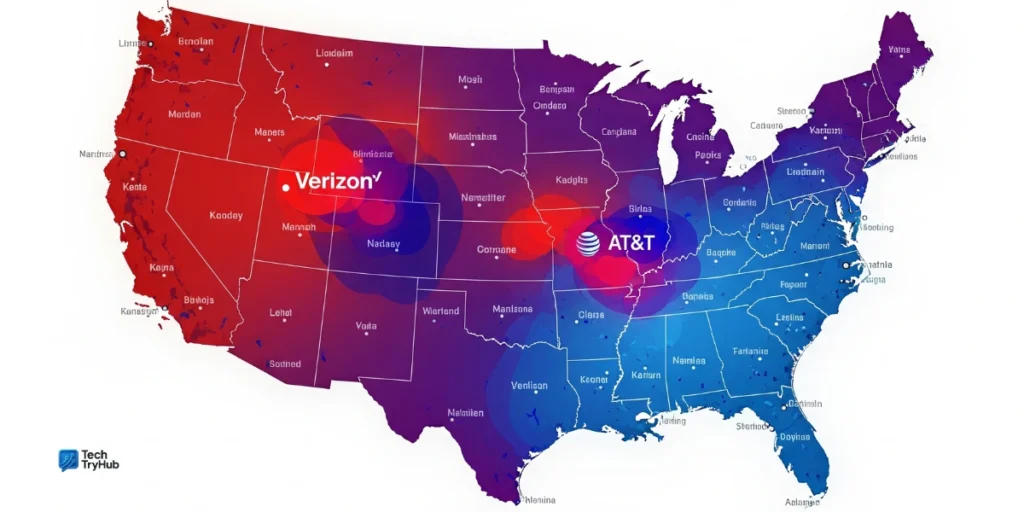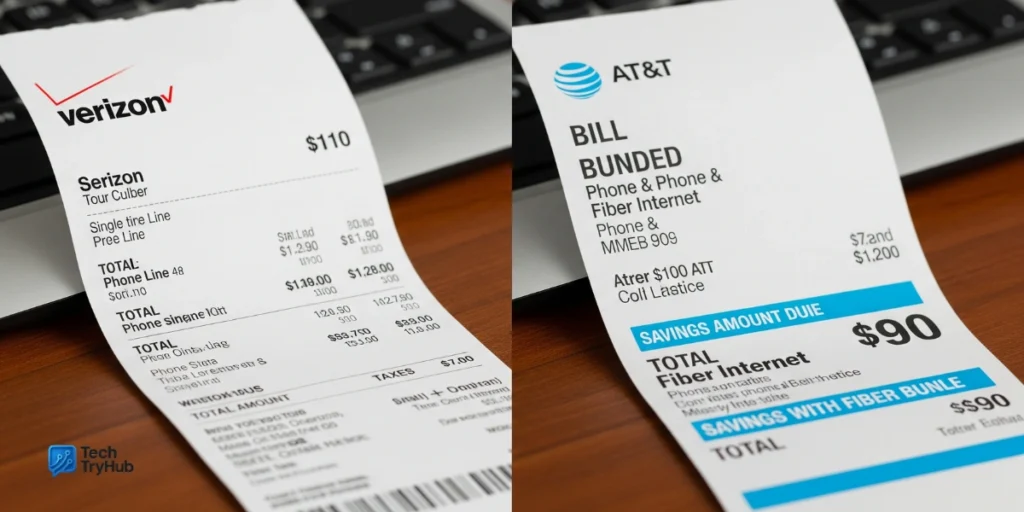Introduction: The Everyday Dilemma
Picture this: you’re standing in a crowded phone store, the smell of new electronics in the air, two sales reps smiling at you. One holds out the latest iPhone with an AT&T plan, the other flashes Verizon’s “fastest network” pitch. You just want reliable service without paying an arm and a leg. Sound familiar?
That’s the daily dilemma for millions of Americans AT&T versus Verizon. Both are giants, both promise the best, but the truth is more nuanced. Coverage maps look impressive, pricing tables confusing, and every ad swears their network is “number one.”
So, how do you actually decide which one’s better for you? Let’s break it down with real data, recent studies, and a bit of human perspective.
AT&T vs Verizon Coverage: Who Connects More People?
Coverage has always been Verizon’s crown jewel. For years, they’ve marketed their near-universal LTE footprint and “Can you hear me now?” reliability.
- Verizon: Covers about 99% of the U.S. population with LTE, plus a growing national 5G presence. Their Ultra Wideband 5G offers blazing speeds but is more concentrated in cities.
- AT&T: Also offers broad LTE coverage and has pushed aggressively into low-band 5G, giving them wide rural reach, even if speeds aren’t always top-tier.
According to J.D. Power’s 2024 Network Quality Study, Verizon edges out AT&T in several regions with fewer dropped calls and failed connections per 100 users. But the difference is slim think 8 vs 9 issues per 100 connections in the Mid-Atlantic.
Translation: Verizon might give you a slight edge if you’re in rural Montana or traveling cross-country often. But in most cities and suburbs, AT&T’s coverage is equally solid.
Key Takeaways:
- Verizon = slight lead in rural consistency and Ultra Wideband speeds.
- AT&T = broader low-band 5G reach, good for rural users too.
- In cities, differences are minimal for most people.

Pricing and Plans: Where Your Money Goes
Let’s be honest carrier pricing can feel like reading tax law. Every add-on changes the deal. But here’s the gist:
- Verizon Unlimited Welcome: Starts around $65/month (single line), but perks like Disney+ or hotspot data cost extra. Their premium plan, Unlimited Ultimate, can push past $90/month.
- AT&T Unlimited Starter: Priced similarly, but AT&T has leaned into bundle discounts. Pair wireless with AT&T Fiber, and you can shave $20–30 off monthly bills.
Real-Life Example:
I know a friend in Dallas who switched from Verizon to AT&T simply because the fiber + wireless bundle cut his bill from $160 to $125 for two lines. That’s not pocket change.
| Plan Type | AT&T | Verizon |
|---|---|---|
| Entry Unlimited | $65/mo | $65/mo |
| Premium Unlimited | $85–$90/mo | $90+/mo |
| Family of 4 (mid-tier) | ~$140–160 | ~$160–180 |
| Bundle Deals | Yes (Fiber + Wireless) | Limited |
Key Takeaways:
- Base prices are similar.
- Verizon charges more for perks.
- AT&T bundles save families real money.

Speed and Performance: Which Network Feels Faster?
Network speed isn’t just bragging rights it’s the difference between smooth Zoom calls and awkward freezes.
According to Ookla’s Q2 2024 U.S. Speedtest Report, T-Mobile leads the nation in raw speed, but between AT&T and Verizon:
- Verizon’s Ultra Wideband 5G often delivers faster top speeds in cities.
- AT&T’s mid-band and low-band 5G deliver steadier consistency, especially outside metro hubs.
So, if you’re in downtown Chicago streaming 4K Netflix, Verizon may fly. If you’re driving across Kansas, AT&T might feel less patchy.
Key Takeaways:
- Verizon = higher peak speeds in cities.
- AT&T = steadier mid-range performance across regions.
- For rural consistency, AT&T may win; for urban speed demons, Verizon is tempting.
Customer Satisfaction: Who Treats Users Better?
Here’s where AT&T quietly shines.
The ACSI 2024 Wireless Carrier Report gave AT&T a 78/100, the highest among major carriers. Verizon trailed at 74/100. Customers cite AT&T’s billing transparency and newer app design as plus points.
That said, AT&T also suffered a nationwide outage in February 2024, leaving millions offline for hours. Incidents like that stick in people’s minds.
Verizon, on the other hand, gets fewer headline-grabbing outages but more complaints about nickel-and-diming perks.
Mini-Summary:
AT&T seems to make customers happier day-to-day, but reliability hiccups can hurt trust. Verizon may feel pricier, but fewer service breakdowns earn them steady loyalty.
Business & Enterprise Users: Not Just About Consumers
It’s easy to forget that AT&T and Verizon also compete fiercely for enterprise contracts.
- AT&T: Tops satisfaction for medium and large businesses. They’re known for secure VPNs, IoT solutions, and integrated fiber + mobile deals.
- Verizon: Favored by small businesses (fewer than 20 employees), thanks to simplicity and predictable pricing.
So, if you’re running a 200-employee tech firm, AT&T might be the better partner. If you’re a family-owned bakery with 3 lines? Verizon’s business packages may feel simpler.
Real-Life Scenarios: Which Should You Choose?
Instead of blanket answers, let’s think by lifestyle:
- Road Warriors / Truck Drivers → Verizon (edge in rural coverage + reliability).
- Big Families in Fiber Areas → AT&T (bundle savings + good satisfaction).
- Tech-Savvy Urbanites → Verizon (fast Ultra Wideband 5G).
- Budget-Conscious Students → AT&T (cheaper bundles, student discounts).
- Small Businesses → Verizon.
- Mid-Large Enterprises → AT&T.
Conclusion: Which One Wins?
So, who wins the AT&T versus Verizon battle in 2025? The answer depends on your lifestyle:
- For coverage consistency and speed in cities → Verizon.
- For savings, bundles, and overall satisfaction → AT&T.
It’s less about which carrier is “the best” and more about which is best for you.
👉 Before signing up, check both carriers’ coverage maps for your ZIP code, and don’t ignore bundle deals they can save you hundreds each year.
Your growth (and savings) start today take the first step, compare wisely, and pick the plan that truly fits your life.
FAQ: AT&T vs Verizon (2025 Edition)
1. Is AT&T cheaper than Verizon in 2025?
Yes, for most comparable plans AT&T is slightly cheaper, especially when you bundle with AT&T Fiber. Verizon tends to charge more for perks.
2. Who has better 5G coverage: Verizon or AT&T?
Verizon has stronger high-speed 5G in cities, while AT&T’s low-band 5G gives it wider reach in rural areas.
3. Is Verizon more reliable than AT&T?
Generally, Verizon reports fewer dropped calls and network issues, according to J.D. Power 2024. But the difference isn’t massive.
4. Which carrier has higher customer satisfaction?
AT&T, according to the ACSI 2024 report. They scored 78/100 compared to Verizon’s 74.
5. Is it worth switching from Verizon to AT&T?
If you live in an AT&T Fiber area or want to save on bundles, yes. If rural coverage is critical, Verizon might still be better.
6. Who is better for small businesses: AT&T or Verizon?
Verizon suits small businesses with simple needs, while AT&T is preferred by medium and large enterprises.
7. Can I keep my number if I switch from Verizon to AT&T?
Yes, number portability laws let you keep your number when switching carriers.